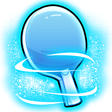Ball coming back
Rules
Jonas Normark Asked 10 years ago
Hi Jeff and Alois, i have a question. If I’m in the middle of a game, and i play a really heavy backspin so that it bounces first on my opponents side, and then its coming back to my side and bounces on my side of the table. Do i get a point for that, or does that count as my oppentents hit and you can just keep playing? /Jonas
 Alois Rosario Answered 10 years ago
Alois Rosario Answered 10 years ago
Hi Jonas,
You would get a point for that. For the rally to continue, your opponent needs to hit the ball before it comes back onto your side.
Recommended Video
Thoughts on this question
Become a free member to post a comment about this question.
Jean Balthazar Posted 10 years ago
Hi Alois,
"before it comes back onto your side" is correct, but not everybody understands the same thing here. A couple of month ago, a guy served against me with underspin, the ball hit the edge of the table on his side, causing the ball to pop up very high and it bounced close to the net on my side, wanting to quickly go back to my opponent's side due to the backspin. Standing behind the table on my side, I didn't have enough time to run around the table to get closer to the ball so I was just barely able to smash it from where I was without pushing the table with my legs. My opponent accused me of having hit the ball from over his side of the court, saying that was illegal and so he should get the point. Not arguing that rule I was unaware of at that point, I just demonstrated that I was not tall enough to have done that and after a lot of shouting and even witnesses testimonies from his own team, he gave up (nevertheless calling me a liar, which is always pleasant to hear). Anyway, that's just for the anecdote, but coming to the point, I made some research about this and I found out that under the current rules, actually nothing at all tells you that you would have to shoot from behind the net, be it over your opponents part of the court or anywhere else.
The rule used to say: "The ball, having been served or returned, shall be struck so that it passes over or around the net and touches the opponent's court, either directly or after touching the net assembly." With that, it would have been practically impossible to make a valid shot from your opponent's side (i.e. shoot do that the ball goes over or around the net and then back on your opponent's side of the court). But the part about "passing over of around the net" has been suppressed at some point, as you can see here under 2.7.1. where it is crossed out : http://www.ittf.com/ittf_handbook/2014/2014_EN_HBK_CHPT_2.pdf
Also, if you check the on-line version of the rules on the ITTF site, you'll see that this part has been effectively removed (again, see section 2.07.01.): http://www.ittf.com/ittf_handbook/ittf_hb.html
In the French version of the rules, they have for now kept the original version, but they have added a comment saying: "Nevertheless, if the ball comes back over the net by itself, it can be struck by the opponent while it is still in play, in such manner that it hits the opponent's part of the court directly." (i.e., without crossing the net again).
Anyway, the current English version makes it pretty clear: a valid return is when the ball is hit and then lands onto the opponent's part of the court as long as it didn't hit anything else than the net assembly in between.
I'm pretty sure not many people will be aware of this, and it seems natural to not play on your opponent's side of the net, so I'm glad these situations don't happen often at all. I think they removed the "has to cross the net" part as a simplification, as it can be very hard to judge whether or not somebody has crossed an imaginary plane extending to infinity around the net. So I think it's a good thing.
Thoughts?
Hi Jean,
You are definitely allowed to hit the ball when it is on your opponents side of the net. So you should have won the argument.
Jean Balthazar Posted 10 years ago
Yep, now I know that even if he were right about me hitting over his side of the court, the point would have been mine anyway. I printed out the corresponding page of the rules and will hand it over to him at the return match. I'm sure he will take it very well :o) (he is well known for using any possible opportunity to destabilise his opponents).
Hi Jean,
We even filmed a video response to another question on this topic titled Crossing Over to the Other Side.
Jean Balthazar Posted 10 years ago
Thanks for the reference Jeff, this makes it very clear.